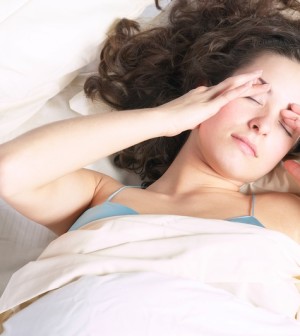- 7 Best Breads for Maintaining Stable Blood Sugar
- Gelatin vs. Collagen: Which is Best for Skin, Nails, and Joints?
- The Long-Term Effects of Daily Turmeric Supplements on Liver Health
- Could Your Grocery Store Meat Be Causing Recurring UTIs?
- Are You Making This Expensive Thermostat Error This Winter?
- Recognizing the Signs of Hypothyroidism
- 10 Strategies to Overcome Insomnia
- Could Artificial Sweeteners Be Aging the Brain Faster?
- Techniques for Soothing Your Nervous System
- Does the Water in Your House Smell Funny? Here’s Why
Impulsive Food Purchases Tied to Too Little Sleep, Study Finds


THURSDAY, Sept. 5Lack of sleep can lead people to buy more food and more high-calorie items at the supermarket, a new study finds.
“Our finding provides a strong rationale for suggesting that patients with concerns regarding caloric intake and weight gain maintain a healthy, normal sleep schedule,” study first author Colin Chapman, of Uppsala University, said in a journal news release.
For the study, researchers gave 14 normal-weight men in Sweden a budget of about $50 and told them to buy as much as they could out of a possible 40 food items, which included 20 high-calorie and 20 low-calorie foods. The men did this after a night of sleep deprivation and after a good night’s sleep.
Before they shopped, the men were given a typical breakfast in order to minimize the effect of hunger on their food purchases, according to the study, published online Sept. 5 in the journal Obesity.
The purchases amounted to 9 percent more calories and 18 percent more food after a night of sleep deprivation than after a good night’s sleep. The researchers also found that the morning after sleep deprivation, the men had higher blood levels of a hormone (ghrelin) that increases hunger.
However, there was no link between ghrelin levels and food purchasing. This suggests that factors such as impulsive decision-making may play a stronger role in food purchasing choices, the researchers said.
Chapman and his colleagues said that follow-up studies are needed to determine whether sleep deprivation-related changes in food purchasing behavior also occur when people are partially sleep deprived.
Future research should also examine sleep deprivation’s potential impact on all types of buying decisions, the study authors said.
More information
The U.S. National Institute of Neurological Disorders and Stroke has more about sleep.
Source: HealthDay
Copyright © 2026 HealthDay. All rights reserved.










